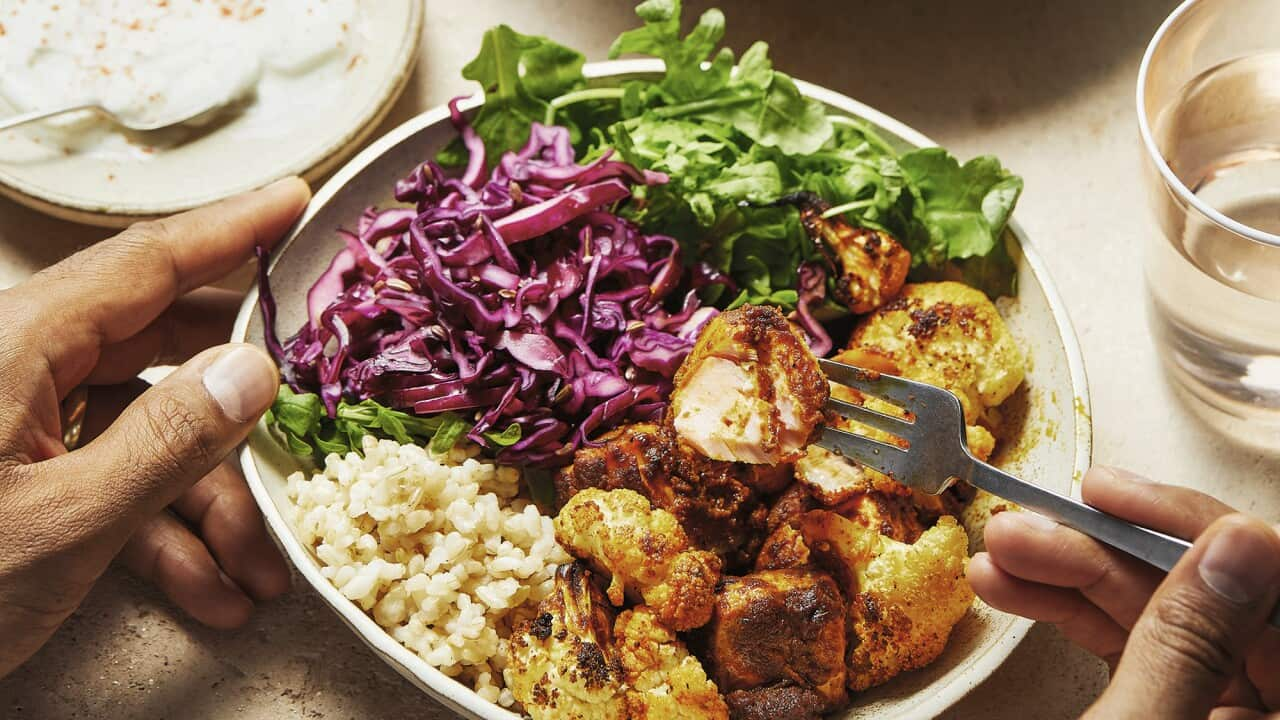serves
2
prep
10 minutes
cook
25 minutes
difficulty
Easy
serves
2
people
preparation
10
minutes
cooking
25
minutes
difficulty
Easy
level
Ingredients
- 1½ tbsp tikka masala paste or mild curry paste
- 300 g salmon, skin on, cut into thick 4 cm chunks
- 300 g cauliflower, broken into 2 cm florets
- 1 tsp mustard seeds
- ½ tsp ground turmeric
- ½ tsp Kashmiri chilli or sweet paprika
- 3 tsp olive oil, plus extra to drizzle
For the fennel and cabbage pickle
- 100 g red cabbage, finely shredded with a mandolin
- 2 tsp fennel seeds
- 4 tsp red wine vinegar
- 4 tsp apple juice or 1 tsp sugar
- ½ tsp salt
To serve
- 150 g cooked short-grain brown rice, warmed
- 2 tbsp Greek yoghurt
- 100 g rocket leaves
Marinating time: 20 minutes (or overnight).
Instructions
- Preheat the oven to 200°C fan-forced.
- Smother the salmon in the curry paste and cover with foil in a bowl. Leave to marinate in the fridge for 20 minutes (it’s even better overnight).
- Add the cauliflower to a baking tray, sprinkle over the spices and drizzle over the olive oil and mix well. Then season well and bake for 15 minutes.
- Meanwhile, for the pickle, add the cabbage, fennel seeds, vinegar, apple juice or sugar and salt to a mixing bowl and scrunch everything together with your hands for 30 seconds. Set aside.
- Remove the tray from the oven, toss the cauliflower florets and turn up the heat to 220°C fan-forced. Nestle the salmon, skin-side up, between the cauliflower florets and bake for another 10–12 minutes until the salmon is cooked through and golden coloured with some charring.
- Build your bowls with the warmed rice, fennel and cabbage pickle, dollops of yoghurt, salmon and cauliflower, and rocket leaves with a drizzle of oil.
Note
You can use an air fryer to cook the salmon instead in about half the time.
Extracted from The Doctor’s Kitchen: Healthy High Protein by Dr Rupy Aujla (Ebury Press, $49.99). Photography by Andrew Burton.
Cook's Notes
Oven temperatures are for conventional; if using fan-forced (convection), reduce the temperature by 20˚C. | We use Australian tablespoons and cups: 1 teaspoon equals 5 ml; 1 tablespoon equals 20 ml; 1 cup equals 250 ml. | All herbs are fresh (unless specified) and cups are lightly packed. | All vegetables are medium size and peeled, unless specified. | All eggs are 55-60 g, unless specified.

